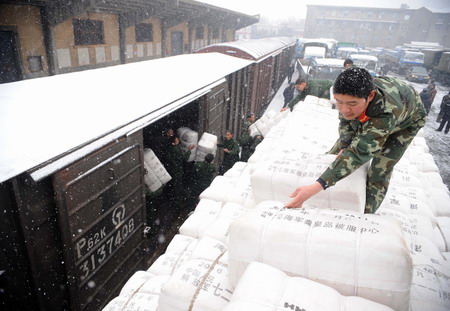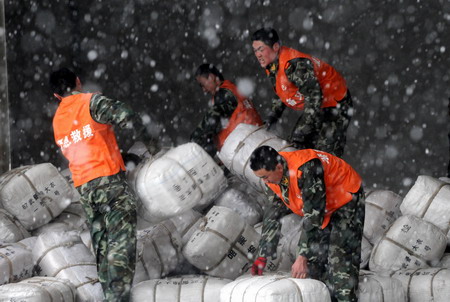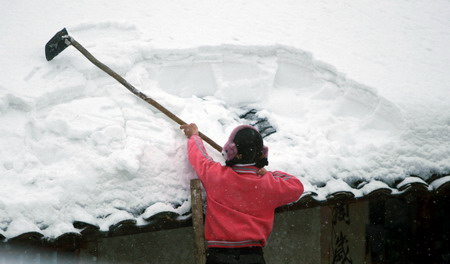China is no stranger to natural disasters, but the heavy snow that strangled much of the country over the past three weeks could be one of the most memorable because of its scope, duration and impact. Millions, perhaps tens of millions have been suddenly thrown back to an era without most modern conveniences and economic losses stand at about 53.8 billion yuan (7.5 billion U.S. dollars).
Massive disruption
More than 160 counties and cities in central China have had blackouts and water shortages. Chenzhou, a city of 4 million in Hunan Province, has been without power and water for a week. Even the radio has fallen silent.
"Radio and telecom services stopped. I feel like it is the end of the world," said a taxi driver surnamed Lu. He said it had been very difficult to fill the tank of his vehicle because many gas stations without power generators were forced to close.
The worst snow in five decades has so far killed 60 people and forced nearly 1.76 million people to relocate. Nineteen provincial regions and the Xinjiang Production and Construction Corp. have reported losses from the crisis, which toppled down 223,000 houses and damaged another 862,000, said Zou Ming, an official with the Ministry of Civil Affairs.
Hunan, Hubei, Guizhou, Guangxi, Jiangxi and Anhui were the worst hit regions. The central government has allocated 331 million yuan to fund local disaster relief work, he said.
Continuing shortages
"The snow has taken a toll on the Chinese economy," said Zhu Hongren, deputy director of the Bureau of Economic Operations with the National Development and Reform Commission (NDRC).
Most parts of China remained very short of electricity amid severe coal shipment disruptions and physical damage to the grid caused by the prolonged snow, rain and cold weather.
As of Jan. 28, the country had experienced a power gap peaking at nearly 40 million kilowatts as a coal shortage cut power generation at some plants, according to the State Electricity Regulatory Commission (SERC).
The State Council, or the cabinet, has established a command center to coordinate contingency measures for coal, oil and power supply, transportation and disaster relief in snow-hit areas, said the NDRC's Zhu.
On Friday, the Ministry of Railways started a 10-day emergency coal shipping campaign, vowing to ensure a daily thermal coal delivery of more than 40,000 cars during the campaign, said Zhao Chunlei, a railway ministry official in charge of train scheduling.
"Coal stockpiles are stable and increasing, with small margins. But the reserves at major power plants are still below the level of last October," said Zhu Hongren.
The deputy director said that some areas could experience "continued shortages" because of transport disruptions and he added that the top priority was to "ensure the stability of prices".
Cole and other vegetables, oranges and wheat, in particular, suffered severely from the snow, according to the Ministry of Agriculture (MOA).
The public has started to feel the pressure of short supplies as vegetable prices escalated across the country.
In Changsha, Wuhan and other hard-hit cities in the southern, central and eastern regions, vegetable prices have more than doubled. Areas not directly affected by the snow, such as Beijing and the southern Guangdong Province, have also seen price rises.
Chaotic transport
Passenger transport has also been seriously disrupted as an estimated 2.2 billion intercity movements are planned by Chinese heading home for the Spring Festival. Some travelers use a combination of methods to make each leg of their journey, accounting for the large figure.
From Jan. 25 to 31, a total of 5.8 million passengers were stranded throughout the railway system and more than 8,000 cargo trains were affected, said Zhao of the railways ministry.
Civil aviation authorities said on Thursday that more than 3,250 flights had been cancelled during the six days through noon on Wednesday.
Bad weather also forced 380 planes to be diverted and delayed 5,550 flights, the General Administration of Civil Aviation of China (CAAC) said. However, airlines still carried 3.17 million passengers from the nation's 52 major airports between Jan. 23 and 29, up 11.8 percent from a year earlier, by flying larger planes.
The Ministry of Commerce holds a video conference in Beijing concerning the market supply of food and commodities for snow-hit areas, February 1, 2008. More bad weather was forecast for China's central, southern and eastern regions which were already paralyzed by record-breaking cold and snow.
Soldiers load quilts and winter clothes onto trucks in snow in Wuhan, central China's Hubei Province to transport the materials to blizzard-hit provinces. More bad weather was forecast for China's central, southern and eastern regions which were already paralyzed by record-breaking cold and snow.
Soldiers load quilts and winter clothes onto trucks in snow in Wuhan, central China's Hubei Province to transport the materials to blizzard-hit provinces. More bad weather was forecast for China's central, southern and eastern regions which were already paralyzed by record-breaking cold and snow.
A girl clears accumulated heavy snow on her roof in Yuexi, east China's Anhui Province, February 1, 2008. More bad weather was forecast for China's central, southern and eastern regions which were already paralyzed by record-breaking cold and snow.
A night view of Lujiazui financial district in central Shanghai, January 31, 2008. Shanghai has turned off all the nightscape lighting in the city to ease the power strain caused by record-breaking cold and snow.
Donations appealed for snow victims
306,000 troops mobilized to combat snow disasters
Snow ravage causes US$2.25b loss in forestry sector
Severe winter weather may persist for another week
China fights 'war' against snow havoc
Winter storm to continue: forecaster
China issues red alert for snowstorms
Brutal weather takes rising toll
Heavy snow piles on the agony
Pre-holiday travel peak at standstill
Gov't urges conservation to ease winter power disruption
(Xinhua News Agency, China.org.cn February 2, 2008)










